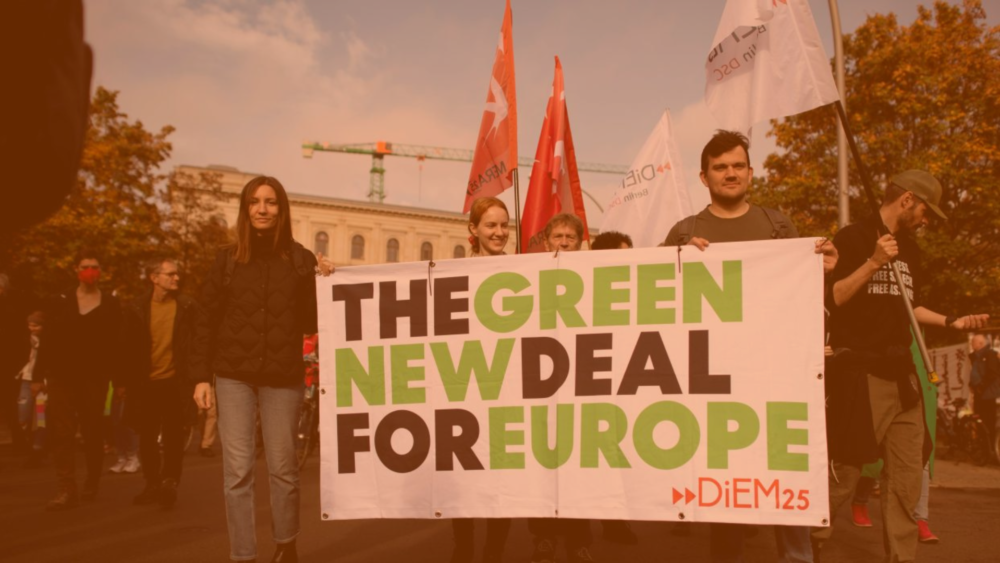DiEM25’s Green New Deal for Europe has provided our movement with an excellent set of pillars to focus on as a movement: Democratic Europe, Ecological and Social Europe, Transparent Europe, Open Europe, Technologically Sovereign Europe and a Peaceful Europe.
In a world that wants political focus to be almost solely on a few hot topics clearly divided into Left and Right that inspire heated debate and drive polarisation, the challenge for DiEM25 as a movement is to clearly define a platform that supports the GNDE and its pillars using solid common sense and uniting Europe’s citizens in support of a programme the is obviously beneficial to the vast majority.
The Green Jobs thematic collective developed a policy that has been accepted by the membership that does just that. It marries the tried, trusted and incredibly successful workers’ cooperative philosophy with a simple method for evaluating organisational impact on the social and natural environment.
As even a fool can see, the exploitative practices of a few control our society and own our ‘democratic’ institutions. Ironically, the wealth that finances this corruption is generated through the efforts of ordinary citizens ‘their’ workforce. To limit the ability of these malevolent individuals and groups to use ‘their’ wealth to corrupt our democratic institutions we simply need to create an opportunity for ordinary citizens to democratically decide whether they should take ownership of the organisations they build, maintain and grow.
Within this article I have attempted to outline why we, as a movement, should fully embrace the policy the Green Jobs Collective developed and work hard to build a cohesive strategy to see it implemented throughout Europe.
Democratic Europe
Given the opportunity a significant proportion of the workforce would decide take ownership of ‘their’ organisations, resulting in a society wide redistribution of wealth and power creating a more equal society and engaging a far greater proportion of the population in democratic practices. Greater engagement of the population is a prerequisite for a functioning democracy.
Democracy in the workplace would bring a far greater understanding of what democracy is, why democracy should be valued and teach us how democracy works. Both private and public organisations should be answerable to their communities with oversight and support being provided by citizens assemblies, bringing true democracy and authority to the community.
Ecological & Social Europe
Higher levels of democratic engagement within society will encourage longer term thinking and the more society thinks about the long term the more likely it is for environmental impact to be placed higher in the decision-making hierarchy.
Engaging the workforce in measuring organisational health beyond revenues and profit will create an alternative perspective on performance. The act of measuring organisational impact on the environment will raise awareness of how our environment is impacted, again leading to better decision making regarding environmental impact.
Transparent Europe
Transparency alone cannot remove corruption entirely but makes it significantly harder for organisations and individuals to hide any misbehaviour. Declaring publicly not only an organisation’s impact but also the reasoning and/or calculations behind all negative, neutral or positive claims will entrench accountability within the organisations as well enabling society to see and understand what is going on within any organisation public or private.
Open Europe
Democratic workplaces do not exploit labour, they do not look for cheap labour to maximise profit. Workers in democratic workplaces will view migrants as potential partners or customers, rather than as threats to their livelihood. Much of the political support for inhumane migrant policies comes from those that feel vulnerable to competitive labour, removing this justifiable fear would remove significant support from nationalistic politicians.
Migrant workers within an organisation will be the democratic equal of all other workers giving them in equal say in their workplace, freeing them from exploitation and providing them with the opportunity to contribute fully to their community.
Technologically Sovereign Europe
Techno-feudalism is focused foremost on maximising shareholder profits. While the creation of a truly technologically sovereign Europe requires significant changes to the legal structures that govern information, communications infrastructure, and technology globally, employee-owned organisations often smaller in scale and with different core values are less likely to seek to monopolise markets making it far more likely that the interests of the people of Europe are prioritised over profit.
Peaceful Europe
Removing the influence that the global military-industrial complex has within Western governments would make political support for many ‘wars’ far less likely. The strengthening of democratic institutions will limit the ability of malign actors to press for military intervention unless necessary and involving the population in democracy and democratic processes to a higher degree will minimise apathy, significantly weakening the ability of those that use nationalistic propagandising to polarise society and promote aggressive behaviour.
Media outlets that are worker owned are highly unlikely to sell pro-war or intervention narratives and far more likely to seek out and report a truer picture of any conflict
Making organisations that are involved in the manufacture or supply of military equipment publicly owned or at a minimum fully transparent would create far tighter controls on the weapons produced and who they are sold to and removing the purely for-profit motives of those that own shares in military equipment supply organisations should result in cutting arms supplies to countries that are likely to be aggressors in conflict.
Do you want to be informed of DiEM25's actions? Sign up here















